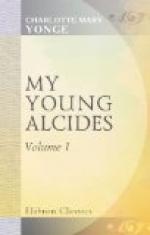Then she called for Nina (were they so intimate already?) and found that young lady in a point device walking dress, nursing the pug and talking to Dermot, and so we set forth for the beech-woods, very soon breaking our five into three and two. Certainly Lady Diana ought to have viewed Dermot’s attentions to the sixty-thousand pounder as exemplary, for he engrossed her and me so entirely with the description of Harold’s victory over a buck-jumper at Boola Boola, that it was full a quarter of an hour before she looked round to exclaim, “What is become of Viola?” And then we would not let her wait, and in truth we never came again upon Viola and Harold till we overtook them at the foot of the last hill, and they never could satisfy Miss Sandford where they had been, nor what they had seen, nor how they had missed us; and Dermot invented for the nonce a legend about a fairy in the hill, who made people gyrate round it in utter oblivion of all things; thus successfully diverting the attention of Miss Sandford, who took it all seriously. Yes, she certainly was a stupid girl.
Every moment that lengthened the veritable enchantment of that autumn afternoon was precious beyond what we knew, and we kept Miss Sandford prowling about the garden on all sorts of pretexts, till the poor girl was tired out, as well she might be, for we had kept her on her feet for three hours and a half, and she made her escape at last to join Viola.
I always think of Harold and Viola, as I saw them at that moment, on the top of the western slope of the lawn, so that there was a great ruddy gold sky behind them, against which their silhouettes stood out in a sort of rich dark purple shade.
“Oh, they are looking at such a sunset!” cried Miss Sandford, climbing up the hill.
“Query!” murmured Dermot, for the faces were in profile, not turning towards the sun in the sky, but to the sunbeams in one another’s eyes—sunbeams that were still there when we joined them, and, in my recollection, seem to blend with the glorious haze of light that was pouring down in a flood over the purple moorland horizon, and the wood, field, and lake below. I was forced to say something about going home, and Viola took me up to her room, where we had one of those embraces that can never be forgotten. The chief thing that the dear girl said to me was, “Oh, Lucy. How he has suffered! How shall I ever make it up to him?”
Poor dear Viola, little did she think that she was to cause the very sharpest of his sufferings.
Nay, as little did he, when we rode home together with the still brilliant sky before us. I never see a lane ending in golden light, melting into blue, and dark pine trees framing as it were the brightness, with every little branch defined against it, without thinking of that silence of intense, almost awe-struck joy in which Harold went home by my side, only at long intervals uttering some brief phrase, such as “This is blessedness,” or “Thank God, who gives women such hearts.”




